

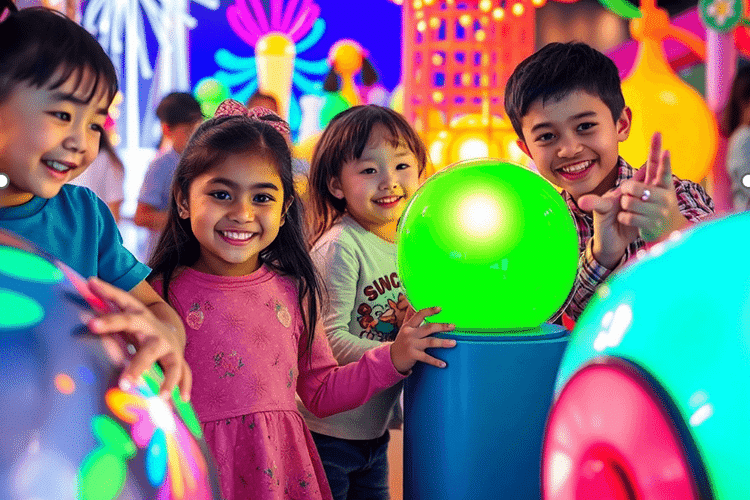
San Jose has a lively art scene that offers families many interactive art installations. These installations ignite imagination and creativity, turning traditional art appreciation into exciting adventures where children actively participate instead of just watching.
The city’s commitment to public art has created spaces where kids can touch, explore, and interact with artistic creations. From the breath-activated light displays at Embers to the tech-powered exhibits at The Tech Interactive, these installations encourage young minds to discover art through play and experimentation.
These artistic spaces serve as powerful educational tools, helping children develop:
Creative problem-solving skills
Sensory awareness
Social interaction abilities
Cultural appreciation
Self-expression
By engaging with interactive art scene in San Jose, children learn to see themselves as creators and contributors to the artistic world around them. These experiences lay the foundation for a lifelong appreciation of arts and culture while making family outings both educational and entertaining.
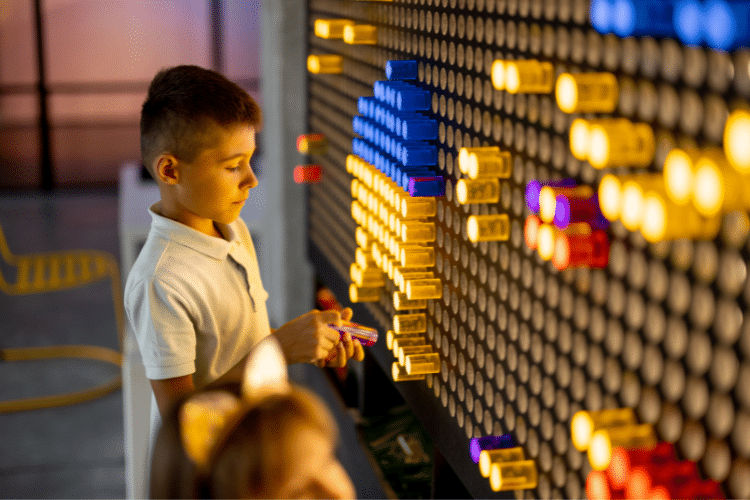
Interactive art installations in San Jose transform passive viewers into active participants, creating dynamic space and scene where art responds to human presence and actions. These installations blend technology, creativity, and human interaction to produce unique creative engagement opportunities for children.
Unlike traditional art forms, interactive installations invite children to:
Touch and manipulate artistic elements
Create their own artistic responses
Experience real-time changes based on their actions
Collaborate with other participants
Engage multiple senses simultaneously
The sensory-rich environment of these installations plays a crucial role in children’s cognitive development. When kids interact with responsive art pieces, they develop:
Spatial awareness through movement-based installations
Problem-solving skills by experimenting with cause and effect
Social skills through collaborative artistic experiences
Motor skills via hands-on manipulation of installation elements
Research shows that interactive experiences in art settings stimulate neural pathways responsible for learning and memory formation. Children who engage with interactive art scene in San Jose often display:
Enhanced creativity and imagination
Improved emotional expression
Stronger self-confidence
Better understanding of abstract concepts
Increased curiosity about their environment
These installations create safe spaces for experimentation where children can explore artistic concepts without fear of failure, making them invaluable tools for early childhood development and creative growth.
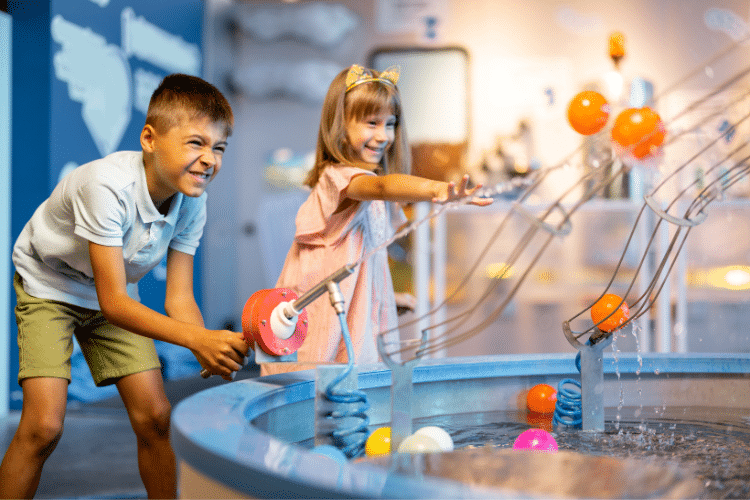
The vibrant art scene in San Jose features remarkable interactive installations that captivate young minds and spark creativity. These installations transform passive observation into dynamic participation, making art accessible and engaging for children of all ages.
The Embers installation is a stunning example of how technology can enhance artistic expression. Located in downtown San Jose, this impressive LED array installation uses advanced motion sensors and interactive elements to respond to people’s movements.
Over 1,000 individually programmable LED lights
Motion-sensitive panels that track movement
Interactive breath sensors that change light patterns
Custom-designed sound elements that complement visual displays
Children feel a sense of wonder as they interact with the artwork, triggering light waves with their movements. The installation’s ability to respond creates a unique connection between young visitors and the art piece, making each experience personal and unforgettable.
The creation of Embers showcases the power of community collaboration. Local tech companies provided resources, while nearby schools participated in testing the interactive elements. This involvement from the community helped shape the installation’s features that are friendly for children:
Sensors that can be adjusted in height for different age groups
Surfaces that are safe and touchable for hands-on exploration
Interaction patterns that are simple and easy to understand
Capability for multiple users to engage as a group
The most captivating aspect of the installation is its breath-responsive features. Children have the opportunity to:
Observe how their breath patterns create light displays
Collaborate with friends to produce synchronized light shows
Experiment with varying speeds of movement
Discover cause-and-effect relationships through play
The installation’s design encourages physical activity and social interaction among young visitors. Many children spend hours exploring different ways to engage with the lights, putting on spontaneous dance performances, and playing games together. This natural combination of movement and art supports their physical development while nurturing creative expression.
Parents have found that the Embers installation is an excellent way to introduce interactive art to children who may be reluctant about traditional museum experiences. The immediate visual feedback and intuitive design create an inviting atmosphere where creativity can flourish effortlessly.
Hopscotch Gallery is the best place in San Jose for immersive art experiences. This 12,000-square-foot space takes the traditional gallery concept and turns it into an exciting playground filled with light, sound, and interactive installations.
The gallery has 20+ unique installations created by both local and international artists. Each installation is designed to ignite your imagination and encourage you to participate actively. Here’s what you can expect:
Walk through rainbow-lit tunnels that respond to your movements
Create digital art projections using hand gestures
Explore infinity rooms with ever-changing light patterns
Interact with sound-responsive LED displays
Experience virtual reality art stations
Young visitors especially love the “Light Forest” installation, where touching illuminated poles produces musical notes and color changes. In the “Digital Canvas” room, children can use special motion-tracking technology to paint with light, instantly transforming their movements into vibrant digital artwork.
Recent reviews from visitors highlight how family-friendly the gallery is:
“My 6-year-old spent hours creating light paintings. She didn’t want to leave!” – Sarah M., San Jose parent
“The interactive elements kept both my toddler and teenager engaged. A rare find!” – James K., family visitor
The gallery changes its installations every season, ensuring that repeat visitors always have something new to see. Special exhibitions often feature local artists, fostering a sense of community and inspiring young artists. Some of the current highlights include:
“Sound Waves” – An audio-responsive light sculpture
“Digital Dreams” – A projection-mapped wonderland
“Touch & Glow” – Interactive LED art walls
Hopscotch Gallery understands the importance of creating inclusive spaces for all visitors. That’s why they have dedicated quiet hours specifically for sensory-sensitive individuals. Additionally, they offer specialized tours designed for school groups, ensuring that students can fully engage with the artwork.
To enhance the experience of young visitors, the gallery has trained staff members who specialize in child engagement. These staff members guide children through the various installations, providing a safe and enriching environment for exploration.
Whether you’re an art enthusiast or simply looking for a fun outing with your family, Hopscotch Gallery promises an unforgettable experience filled with creativity and wonder.
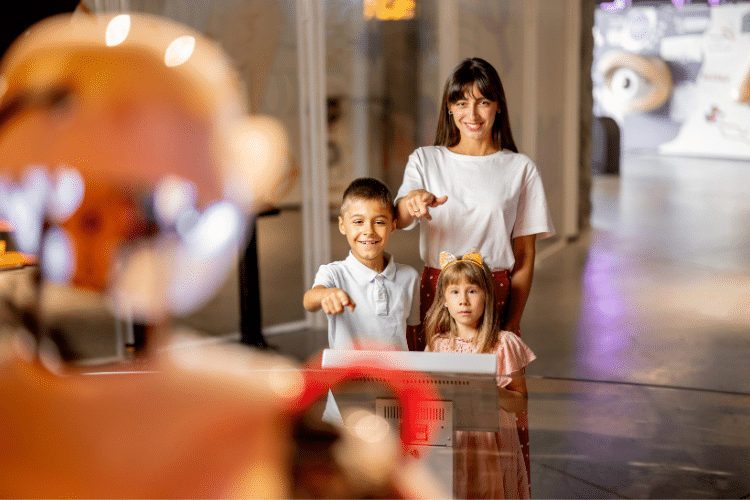
Located in the heart of downtown San Jose, Tech Interactive stands as a symbol of innovation and creativity. This science and technology center becomes an artistic playground with its combination of advanced technology and hands-on exhibits.
Animaker: Children enter a digital animation studio where they use specialized software and hands-on tools to create their own stop-motion masterpieces.
Design Lab: Families can participate in various activities such as building flying machines, programming robots, creating digital music, and designing 3D structures.
Bio Design Studio: Kids can explore the intersection of art and science by painting with living organisms, creating patterns with bioluminescent bacteria, designing new life forms, and examining microscopic art.
Workshops: Throughout the year, special workshops are held on topics such as digital storytelling, coding for artistic expression, electronics projects, and sound art experimentation.
Maker Spaces: The museum offers spaces equipped with tools like 3D printers and laser cutters for children to freely create their own artwork.
Accessibility Initiatives: The Tech Interactive is dedicated to ensuring all children can engage in the creative process through adaptive tools, modified exhibits, multi-language guides, and sensory-friendly hours.
The San Jose Museum of Art is a cultural hub that showcases contemporary visual arts through innovative exhibitions. This vibrant space transforms traditional art viewing into an interactive experience for young visitors.
The museum has special areas designed just for kids, where they can actively participate and learn about art in a fun way. These zones include:
Digital art creation stations where children can use technology to create their own artwork
Sound-responsive installations that respond to movement and create visual effects
Touch-sensitive wall displays that encourage hands-on exploration and interaction
Multi-sensory exhibits designed specifically for different age groups, incorporating various senses like touch, sound, and sight
The museum offers unique programs tailored specifically for children, aiming to nurture their artistic abilities and provide them with opportunities for creative expression. Some of these programs include:
Art Lab Sessions: Guided workshops where kids can experiment with different artistic techniques and materials
Digital Story Corner: Interactive storytelling sessions that combine art and technology
Creative Discovery Tours: Guided tours of the museum’s exhibitions designed specifically for young audiences
The museum is committed to making its facilities and resources accessible to all children, regardless of their abilities or backgrounds. Some of the measures taken include:
Child-height viewing areas to ensure that artworks are easily visible to young visitors
Step stools and viewing aids for children who may need assistance reaching certain exhibits
Clear, kid-friendly descriptions accompanying each artwork to enhance understanding
Sensory-friendly hours designated explicitly for children with sensory sensitivities
The museum regularly features new exhibitions incorporating elements known to ignite children’s creativity. Previous shows have included interactive installations where children’s movements trigger colorful projections and collaborative art projects that invite visitors to contribute their own artistic expressions.
When designing exhibition spaces within the museum, careful consideration is given to how children will interact with the artworks on display. Areas designated as “touch zones” allow young visitors to explore different textures and materials used in various artworks under supervision, while more fragile pieces are housed in secure display cases.
This intentional approach promotes an understanding among children about both the importance of preserving artworks and engaging with them through direct interaction.
In addition to physical accessibility measures implemented at the museum itself, efforts are also being made to create meaningful connections between classroom learning experiences and the institution’s artistic expression opportunities.
Educational programs developed by the museum align with local school curricula, ensuring relevance while providing students with unique insights into visual arts practices beyond what they may encounter within traditional academic settings.
These initiatives help foster a deeper appreciation for art and cultivate critical thinking skills, which are essential for holistic development among young learners.
The Wee Explore PlaySpace at San Jose Public Library transforms traditional library spaces into vibrant artistic havens for young minds. This dedicated area combines literacy, art, and play through thoughtfully designed interactive installations that spark creativity and learning.
The PlaySpace features a collection of sensory-rich panels that invite exploration:
Light and Shadow Wall: Children manipulate colorful transparent shapes on illuminated surfaces
Texture Gardens: Tactile panels with various materials for sensory development
Musical Motion Boards: Sound-producing elements that respond to touch and movement
Story-Inspired Art Stations: Creative spaces where children can draw, build, and craft based on their favorite books
The space integrates STEAM learning principles through:
Digital storytelling stations
Building blocks with LED components
Interactive projection systems
Sound-responsive light displays
Libraries serve as natural incubators for artistic discovery, making art accessible to all families regardless of economic background. The Wee Explore PlaySpace exemplifies this by:
Providing free access to high-quality artistic experiences
Creating a safe, nurturing environment for creative exploration
Offering guided activities led by trained library staff
Supporting early literacy through art-based learning
The PlaySpace’s design encourages parent-child interaction through shared artistic experiences. Each installation includes bilingual instructions and open-ended prompts that spark conversation and imagination. The space rotates its interactive elements seasonally, ensuring fresh experiences for regular visitors while maintaining beloved permanent installations.
Children ages 2-8 particularly benefit from PlaySpace’s blend of art and literacy. The installations support multiple developmental areas:
Fine motor skills through hands-on manipulation
Language development via art-inspired storytelling
Social skills through collaborative play
Critical thinking through creative problem-solving
The space maintains limited capacity to ensure quality experiences, with timed sessions available throughout library operating hours.
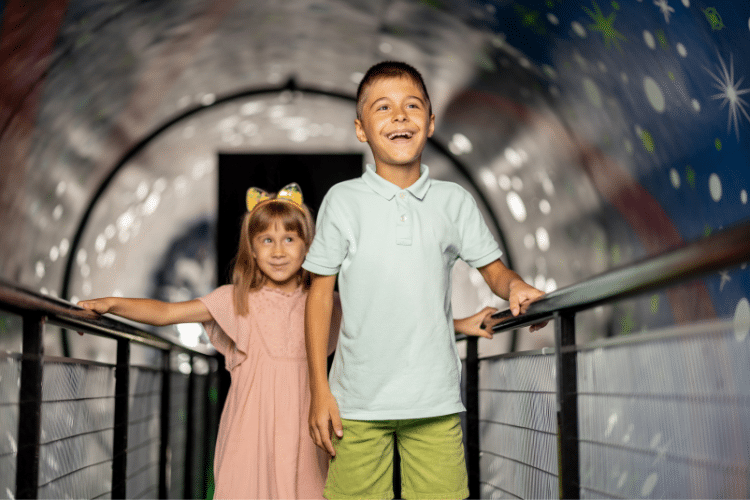
Strategic planning transforms your family outings into memorable art adventures. Here’s your comprehensive guide to visiting interactive art scene in San Jose with kids:
Embers: Early morning (9-11 AM) offers optimal lighting conditions and smaller crowds
Hopscotch Gallery: Weekday afternoons (2-4 PM) tend to be quieter
The Tech Interactive: Tuesday mornings are the least crowded; avoid school field trip hours
San Jose Museum of Art: Saturday mornings provide fresh energy and full programming
Wee Explore PlaySpace: Mid-morning sessions (10 AM-noon) are ideal for young children
Pack snacks and water bottles – artistic exploration builds appetites
Bring a camera to capture creative moments
Wear comfortable shoes for extended walking and standing
Plan 45-60 minutes per installation for optimal engagement
Schedule breaks between locations to prevent sensory overload
Research current exhibitions and installations beforehand
Download venue maps to your phone
Check websites for special events or workshops
Consider membership options for frequent visits
Join mailing lists for updates on new installations
All venues offer wheelchair accessibility
Elevators available at multi-level locations
Rest areas positioned throughout installations
Family restrooms equipped with changing stations
Hand sanitizing stations available
Regular cleaning protocols in place
Clear pathways marked for social distancing
First aid stations at larger venues
Sensory-friendly hours at The Tech Interactive
ASL interpretation available upon request
Noise-canceling headphones available at select locations
Modified experiences for different ability levels
Free parking available at library locations
Validated parking at museum garages
VTA light rail stops near major installations
Bike racks available at all venues
Purchase multi-venue passes
Visit during free admission days
Check library for cultural passes
Look for family package deals
Use student and military discounts where applicable
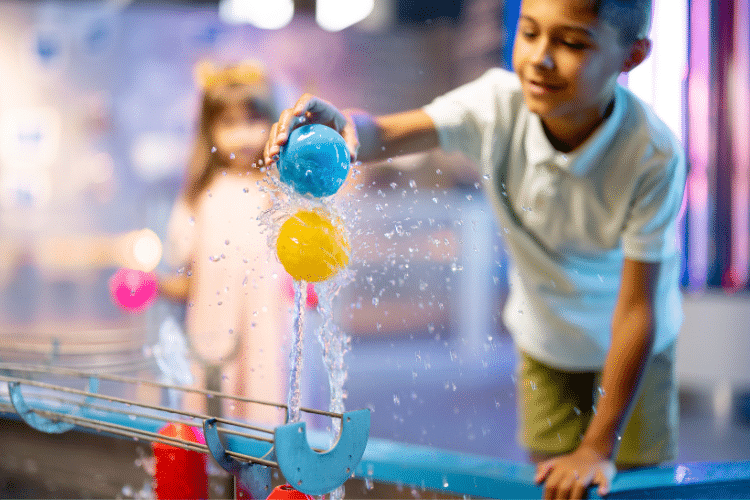
The magic of interactive art installations in San Jose can spark a scene with endless creativity in your home space. Transform your living areas into mini art galleries with these installation-inspired activities:
Create shadow puppet theaters using cardboard boxes and LED lights
Design colorful tissue paper “stained glass” windows
Experiment with flashlights and colored cellophane for light effects
Set up motion-tracking painting using large paper sheets and washable paint
Design dance-activated art using glow sticks in dark rooms
Create wind chimes from recycled materials
Use free animation apps inspired by The Tech Interactive’s Animaker
Set up a green screen area using a solid-colored sheet
Create stop-motion videos with household objects
Mix textured materials like sand, rice, and beans for tactile art
Build sound walls using kitchen tools and instruments
Design scented painting activities with food extracts
Your home art space doesn’t need expensive materials. Common household items can fuel creative exploration:
Empty boxes
Paper rolls
Old magazines
Natural materials from your backyard
Recyclable containers
Local Resources for Art Supplies
San Jose Public Library’s maker kits
SJMA’s online art tutorials
Local craft store workshops
Community art center programs
Digital Resources
Virtual museum tours
Online art classes for kids
Art education apps
Creative project databases
Create a dedicated art space where children can freely experiment. This area becomes their personal gallery, fostering ownership and pride in their creative process. Rotate materials and themes regularly to maintain engagement and mirror the changing exhibits they experience in San Jose’s installations.
Document your children’s creative journey through photos or videos. This documentation helps them see their artistic growth and provides inspiration for future projects. Share these creations with family members or in local community art groups to build connections through creativity.
Consider joining online art communities or local parent groups focused on creative activities. These networks provide fresh ideas, troubleshooting tips, and opportunities for artistic collaboration between families.
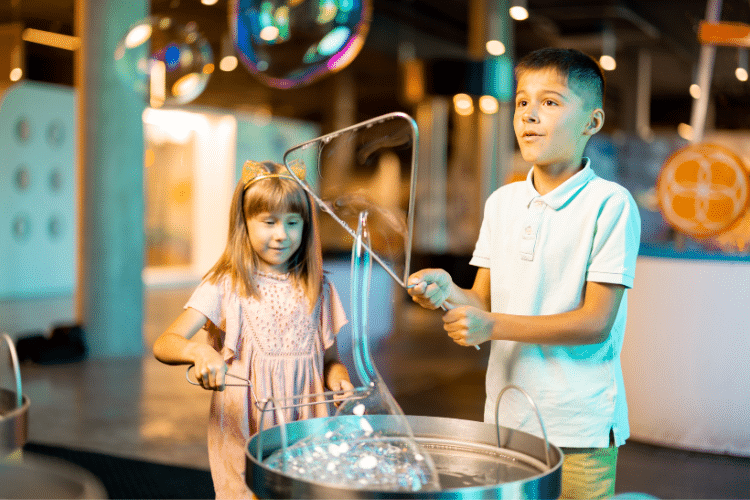
San Jose’s commitment to accessible, family-friendly art scene makes it the perfect destination for creative exploration. From The Tech Interactive and the San Jose Museum of Art to Wee Explore PlaySpace, these venues invite families to embark on unforgettable artistic adventures together.
Ready to spark your child’s imagination and create lasting memories? Visit 4Kids.com to discover the best interactive art experiences San Jose has to offer. Whether you’re looking for inspiring activities, educational opportunities, or unique ways to bond as a family, 4Kids.com is your ultimate guide to kid-friendly adventures. Start planning today, and let the magic of interactive art unfold for your family!
Interactive art installations are creative experiences that engage visitors through sensory involvement, allowing them to participate actively rather than just observe. These installations play a crucial role in children’s learning by promoting cognitive and emotional development.
The Embers installation features LED arrays that respond to breath and movement, creating a unique interactive experience. Its creation involved community participation, emphasizing the importance of collaboration in art, and it effectively engages children by inviting them to explore their own physical interactions.
The Tech Interactive is a museum that emphasizes family engagement through various exhibits like Animaker, which promotes creativity. Families can enjoy hands-on activities designed to inspire innovation and teamwork among children.
The San Jose Museum of Art focuses on visual arts with interactive exhibitions specifically designed for kids. These exhibitions include various interactive elements that make art accessible and engaging for younger audiences, fostering an appreciation for creativity.
Wee Explore PlaySpace is a dedicated area within the San Jose Public Library designed for children to explore art through interactive panels. This space encourages early exposure to artistic concepts and provides a fun environment for creative exploration.
Parents can engage their children in creative activities inspired by local installations by providing art supplies and encouraging imaginative play. Continuing creative exploration outside of installations is important, and resources are available for finding artistic activities to do at home.
Categories :
Tags :
We believe in building & supporting the community and that finding the resources and things to do for your kids should be easy. 4kids.com is a FREE online resource guide for families with kids in a city near you.
View All PostsNotifications